Text
Alright tell me in the tags, what’s Your Poem? That poem you heard once and it has dwelt within you ever since?
42K notes
·
View notes
Text
new quiz y'all! worked on this until 4 am lol. reblog and tell me, what kind of supervillain are you?
36K notes
·
View notes
Text
gender? nah man which butter cookie from kjeldsens do you hoard over
#shitpost#pretzel cookie supremacy#it’s so fucking cute wtf#cronch#‘’are you okay’’ thanks for asking. no i am not#if you don’t know what i’m talking about i mourn for u
34 notes
·
View notes
Text
im avoiding schoolwork! take my uquiz to see what pokemon type you are <3
https://uquiz.com/nQouhS
14K notes
·
View notes
Text
forget gender, what is your true moral alignment?
27K notes
·
View notes
Text
to my understanding azhdaha’s erosion is the loss of memories while zhongli’s erosion is the slow but steady onset of severe clinical depression
#these tags#have cured my depression#bro i laughed so hard holy fuck#actually facts tho zhongli is 99% depression and that’s why i like him
713 notes
·
View notes
Text
whenever a man says a girl he likes reminds him of his mother that bitch freud levels up in hell
#stop proving freud right i hate that man#all his theories r shitty but they’re not entirely wrong#and that’s the WORST PART REEE
667 notes
·
View notes
Text
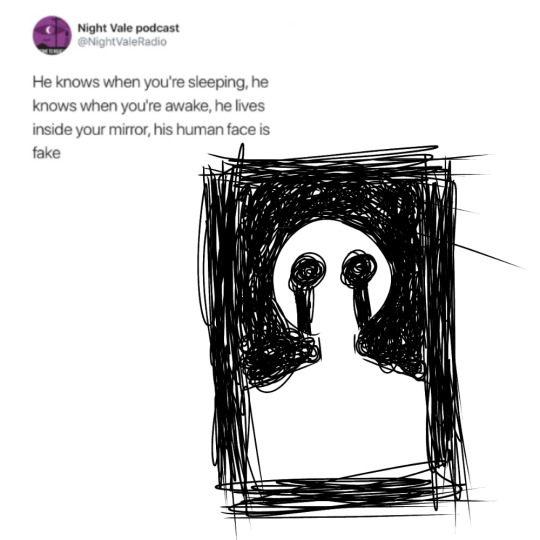
#wtnv twitter#wtnv#welcome to night vale#wtnv tweets#doodle#my art#im tired and i was listening to wtnv what more do you want from me
86 notes
·
View notes
Text
Please reblog if you think that “they/them/theirs” is a valid set of pronouns.
this post must be reblogged by everyone
591K notes
·
View notes
Text

lmao i cried for like a solid hour for the first time in three years
755 notes
·
View notes
Note
I’m not trying to be inflammatory, I’m just curious. How do het ace/aro people face SYSTEMATIC oppression? Gay/bi/trans people face oppression like difficultly adopting children, finding housing, they may be fired from employment because of their gender or orientation. So they are bared from normal parts of live because of their gender/sexuality. Gay ace/aro people face this too, but what do het ace/aro people experience on a societal level?
If you’d been following my blog at all or even bothered to peruse it a little before dropping this message in my inbox, you’d probably already know the answer to your question.
You’d ALSO probably know that there are bi and pan aspecs too (e.g., I’m panromantic demisexual) which isn’t “gay” (does this term also include lesbians?) so I feel like your ask erases part of my own identity and that of others in the community.
For these reasons and more, I’d bet money that you’re not here because you’re “curious”. You’re probably here because you figure this is how you’re gonna stop a “self-imposing” aspec from speaking up for herself.
Well guess what: That’s just hateful & sad.
Regardless though of your intentions, I’m here to say that there is in fact SYSTEMATIC oppression against aspecs. For example, Dr Gordon Hodson wrote this about his 2012 study:
In a recent investigation (MacInnis & Hodson, in press) we uncovered strikingly strong bias against asexuals in both university and community samples. Relative to heterosexuals, and even relative to homosexuals and bisexuals, heterosexuals: (a) expressed more negative attitudes toward asexuals (i.e., prejudice); (b) desired less contact with asexuals; and © were less willing to rent an apartment to (or hire) an asexual applicant (i.e., discrimination). Moreover, of all the sexual minority groups studied, asexuals were the most dehumanized (i.e., represented as “less human”). Intriguingly, heterosexuals dehumanized asexuals in two ways. Given their lack of sexual interest, widely considered a universal interest, it might not surprise you to learn that asexuals were characterized as “machine-like” (i.e., mechanistically dehumanized). But, oddly enough, asexuals were also seen as “animal-like” (i.e., animalistically dehumanized). Yes, asexuals were seen as relatively cold and emotionless and unrestrained, impulsive, and less sophisticated.
When you repeatedly observe such findings it grabs your attention as a prejudice researcher. But let’s go back a minute and consider those discrimination effects. Really? You’d not rent an apartment to an asexual man, or hire an asexual woman? Even if you relied on stereotypes alone, presumably such people would make ideal tenants and employees. We pondered whether this bias actually represents bias against single people, a recently uncovered and very real bias in its own right (see Psychology Today column by Bella DePaulo). But our statistical analyses ruled out this this possibility. So what’s going on here?
If you’ve been following my column, you’ll recall that I wrote a recent article on what I called the “Bigotry Bigot-Tree” – what psychologists refer to as generalized prejudice. Specifically, those disliking one social group (e.g., women) also tend to dislike other social groups (e.g., homosexuals; Asians). In our recent paper (MacInnis & Hodson, in press), we found that those who disliked homosexuals also disliked bisexuals and asexuals. In other words, these prejudices are correlated. Heterosexuals who dislike one sexual minority, therefore, also dislike other sexual minorities, even though some of these groups are characterized by their sexual interest and activity and others by their lack of sexual interest and activity.
This anti-asexual bias, at its core, seems to boil down to what Herek (2010) refers to as the “differences as deficit” model of sexual orientation. By deviating from the typical, average, or normal sexual interests, sexual minorities are considered substandard and thus easy targets for disdain and prejudice. Contrary to conventional folk wisdom, prejudice against sexual minorities may not therefore have much to do with sexual activity at all. There is even evidence, for instance, that religious fundamentalists are prejudiced against homosexuals even when they are celibate (Fulton et al., 1999). Together, such findings point to a bias against “others”, especially different others, who are seen as substandard and deficient (and literally “less human”). “Group X” is targeted for its lack of sexual interest even more than homosexuals and bisexuals are targeted for their same-sex interests.
From news coverage of a recently published study (2016):
What should the average person take away from your study?
Since I first became interested in the issue, I have come to conclude that U.S. society is both “sex negative” and “sex positive.” In other words, there is stigma and marginalization that can come both from being “too sexual” and from being “not sexual enough.” In a theoretical paper, I argued that sexuality may be compulsory in contemporary U.S. society. In other words, our society assumes that (almost) everyone is, at their core, “sexual” and there exists a great deal of social pressure to experience sexual desire, engage in sexual activities, and adopt a sexual identity. At the same time, various types of “non-sexuality” (such as a lack of sexual desire or activity) are stigmatized.
For this particular study, I identified thirty individuals who identified as asexual and asked them first, if they had experienced stigma or marginalization as a result of their asexuality, and, second how they challenged this stigma or marginalization. I found that my interviewees had experienced the following forms of marginalization: pathologization (i.e. people calling them sick), social isolation, unwanted sex and relationship conflict, and the denial of epistemic authority (i.e. people not believing that they didn’t experience sexual attraction). I also found that my interviews resisted stigma and marginalization in five ways: describing asexuality as simply a different (but not inherently worse) form of sexuality; deemphasizing the importance of sexuality in human life; developing new types of nonsexual relationships; coming to see asexuality as a sexual orientation or identity; and engaging in community building and outreach.
I hope that average people would take away from this study the idea that some people can lead fulfilling lives without experiencing sexual attraction but can experience distress if others try to invalidate their identities.
Some of the social isolation we aspecs experience comes from religious communities. Indeed, the popular myth that religious people revere aspecs is very much NOT TRUE. For example, read “Myth 8″ from the VISION Catholic Religious Vocation Guide:
MYTH 8: Religious are asexual
Question: What do you call a person who is asexual?
Answer: Not a person. Asexual people do not exist. Sexuality is a gift from God and thus a fundamental part of our human identity. Those who repress their sexuality are not living as God created them to be: fully alive and well. As such, they’re most likely unhappy. All people are called by God to live chastely, meaning being respectful of the gift of their sexuality. Religious men and women vow celibate chastity, which means they live out their sexuality without engaging in sexual behavior. A vow of chastity does not mean one represses his manhood or her womanhood. Sexuality and the act of sex are two very different things. While people in religious life abstain from the act of sex, they do not become asexual beings, but rather need to be in touch with what it means to be a man or a woman. A vow of chastity also does not mean one will not have close, loving relationships with women and men. In fact, such relationships are a sign of living the vow in a healthy way. Living a religious vow of chastity is not always easy, but it can be a very beautiful expression of love for God and others. Religious women and men aren’t oddities; they mirror the rest of the church they serve: there are introverts and extroverts, tall and short, old and young, straight and gay, obese and skinny, crass and pious, humorous and serious, and everything in between. They attempt to live the same primary vocation as all other Christians do: proclaiming and living the gospel. However, religious do this as members of an order that serve the church and world in a particular way. Like marriage and the single life, religious life can be wonderful, fulfilling, exciting, and, yes, normal. Yet, it also can be countercultural and positively challenging. It’s that for us and many others. If you thought religious life was outdated, dysfunctional, or dead, we hope you can now look beyond the stereotypes and see the gift it is to the church and world.
NOTE: YOU CAN BE A GAY CATHOLIC PERSON BUT NOT ASEXUAL, BC ASEXUALITY DOESN’T EXIST (yet somehow we’re also “most likely unhappy” and “oddities”). I sincerely hope and believe that not all religions characterize us aspecs this way. But here are some personal accounts I found on a reddit site answering the question “Do any religions have a negative stance toward asexuals?”:
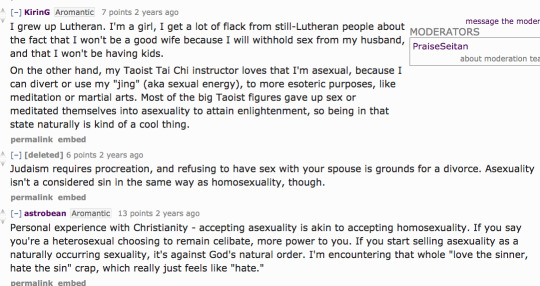

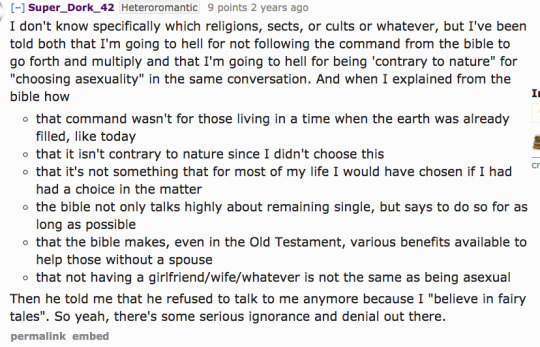
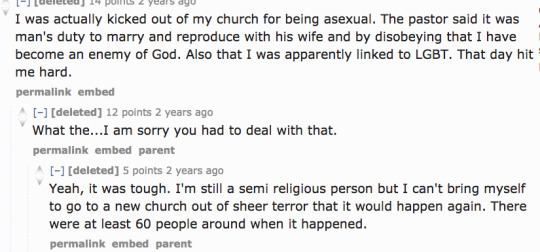
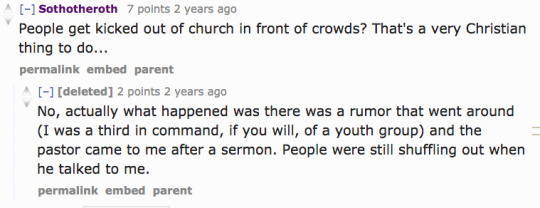
Please note that the Christian pastor in the last example was fearful (or something?) that an asexual was helping to lead a youth group and kicked them out of the church as a result.
3K notes
·
View notes
Text
Hi please reblog if you believe aromantic and asexual people belong in the lgbt+ community despite any other romantic or sexual or gender orientations
I just need some nice notes because I still feel kind of awful and yeah
4K notes
·
View notes
Text
Aces are part of the lgbtqa+ community
Aros are part of the lgbtqa+ community
Aroaces are part of the lgbtqa+ community
647 notes
·
View notes
Text
Can you please reblog if your blog is a safe place for lesbian, gay, bisexual, transgender, asexual, aromantic, pansexual, non binary, demisexual or any other kind of queer or questioning people? Because mine is.
457K notes
·
View notes
Text
🏳️🌈This blog supports all sexual orientations and gender identities
Reblog if yours does too.
141K notes
·
View notes